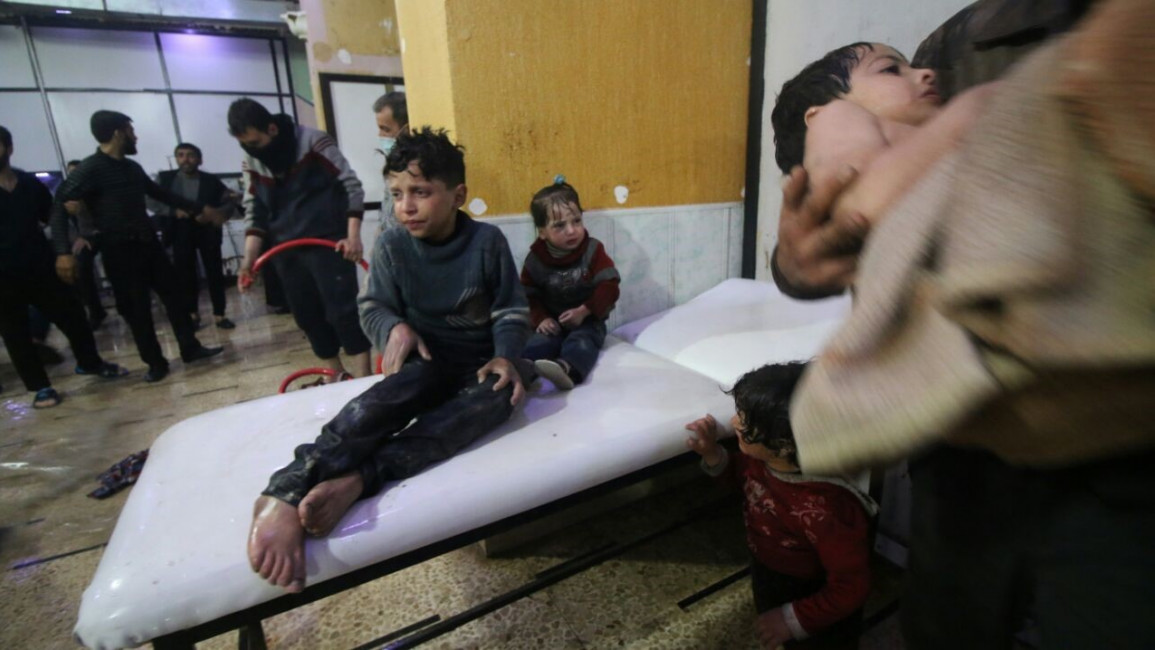OPCW says Syrian regime to blame for deadly 2018 Douma chlorine attack
The global chemical weapons watchdog blamed the Syrian regime on Friday for a 2018 chlorine attack that killed 43 people, in a long-awaited report on a case that sparked tensions between Damascus and the West.
Investigators said there were "reasonable grounds to believe" that at least one Syrian regime air force helicopter had dropped two cylinders of the toxic gas on the rebel-held town of Douma during Syria's civil war.
Damascus and its ally Moscow claimed the attack was staged by rescue workers at the behest of the United States, which launched air strikes on Syria days afterwards along with Britain and France.
The Douma case also caused controversy after leaks from two former employees cast doubt on earlier findings by the Hague-based Organisation for the Prohibition of Chemical Weapons (OPCW).
But the OPCW said its investigators had "considered a range of possible scenarios" and concluded that "the Syrian Arab Air Forces are the perpetrators of this attack".
"The use of chemical weapons in Douma - and anywhere - is unacceptable and a breach of international law," OPCW Director-General Fernando Arias said in a statement.
"The world now knows the facts - it is up to the international community to take action, at the OPCW and beyond".
Moreover, the UK Minister of State for the Middle East, South Asia and UN Lord Ahmad of Wimbledon, has condemned the Assad regime for its use of chemical weapons following the publication of the report.
He said: "We share the OPCW’s assessment on Bashar al-Assad and his regime’s culpability and commend their resilience, professionalism and expert independent analysis in the face of desperate attempts by Syria and Russia to block this investigation".
"We remember the victims of the Douma attack and remain committed to pursuing the justice they deserve. We are steadfast in our commitment to holding all those who use chemical weapons to account," he added.
The watchdog said that "at least one Mi-8/17 helicopter of the Syrian Arab Air Force, departing from Dumayr airbase and operating under the control of the Tiger Forces, dropped two yellow cylinders" on April 7, 2018.
The cylinders hit two residential buildings in central Douma, it said.
The first "ruptured and rapidly released toxic gas, chlorine, in very high concentrations, which rapidly dispersed within the building, killing 43 named individuals and affecting dozens more," said the report.
The second cylinder smashed into an apartment and slowly released some chlorine "mildly affecting those who first arrived at the scene".
Investigators had examined 70 environmental and biomedical samples, 66 witness statements, and other data including forensic analysis, satellite images, gas dispersion modelling, and trajectory simulations, it said.
Douma was held by rebels at the time of the incident, which came during a major offensive by Syrian regime forces to retake the town near the capital Damascus.
Emergency workers said at the time that they had treated people suffering breathing problems, foaming at the mouth and other symptoms.
OPCW inspectors visited the scene after delays and determined that chlorine was used, however they did not have the remit at the time to say who they believed was behind the attack.
But thanks to new rules, which Syria and ally Russia have opposed, the watchdog is now able to point the finger of blame, and in this case has done so at Damascus.
"There are reasonable grounds to believe that the Syrian Arab Air Forces were the perpetrators of the chemical weapons attack in Douma," it said.
OPCW DG Arias: “This third report of the IIT provides the evidence that the Syrian Arab Air Force carried out a chemical weapons attack in #Douma in 2018. The world now knows the facts – it is up to the international community to take action, at the #OPCW and beyond.” pic.twitter.com/Sm8KpQMHvb
— OPCW (@OPCW) January 27, 2023
The Assad regime has accused opposition rebels and emergency workers of staging the attack it by bringing in dead bodies and filming them, or alternatively arguing that an Islamist chemical weapons factory was hit.
But the OPCW said its team "thoroughly pursued lines of inquiry and scenarios suggested by Syrian authorities and other state parties, but was unable to obtain any concrete information supporting them."
It also said it "regrets" that Syria refused to allow it further access to the site to investigate.
The report also dismisses claims by former inspectors who alleged that the watchdog had altered original findings in 2018 to make the evidence of a chemical attack seem more conclusive.
It added that the basis of "reasonable grounds' was the "standard of proof consistently adopted by international fact-finding bodies and commissions of inquiry".
Damascus denies the use of chemical weapons and insists it has handed over its stockpiles under a 2013 agreement, prompted by a suspected sarin gas attack that killed 1,400 in the Damascus suburb of Ghouta.



